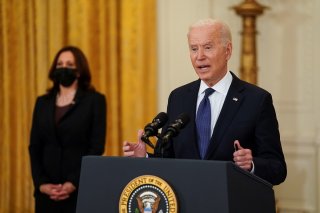Stimulus Money for Parents? Joe Biden Has A Big Plan Coming In July
All told, the White House claimed in April that 66 million children would benefit from the plan.
The American Rescue Plan, passed in March, has mostly finished sending out its round of stimulus payments. Of the money set aside for this purpose, around $380 billion has been sent out – primarily through direct deposits, and later through mailed checks.
The $1400 payments from the American Rescue Plan succeed the $600 checks issued in the final months of the Trump administration, which themselves succeeded the $1200 checks passed under the CARES Act. All told, throughout the duration of the pandemic, most adult Americans received $3200 in stimulus spending – the actual benefits of which were subject to intense debate.
There were certain qualifications for these payments. Rich people, for instance, were mostly left off the stimulus payments. Some families with children received further payments - $500 through the CARES Act – on those children’s behalf.
The rationale for these payments was that, while children were not directly affected by the economic downturn, their parents would need to continue paying their expenses; therefore, they received stimulus money to help cover those expenses.
Crucially, the Biden administration sees a novel way to continue these payments, even after the pandemic ends. One of the measures contained within the American Rescue Plan increased the Child Income Tax Credit, a tax deduction that parents can claim on their children, from $2000 per child per year to $3000 (or $3600 for children under the age of six). All told, the White House claimed in April that 66 million children would benefit from the plan.
The IRS went a step further in early May when they began to send partial payments in advance – in other words, sending the rebate checks out before the families paid their taxes in the first place. The agency summarized its position in early May; it explained that it was sending out the checks, in monthly increments, from July through December to taxpayers who had a main home in the United States for half the year or more. The caveat was that this half would not be deductible from the taxes families paid in Spring 2022.
There is no word yet on what the IRS will do come January. However, the monthly payment of $300 per month (or $250 for older children) for six months effectively amounts to an extra stimulus check of $1500 to $1800 for each child for 2021 – and, one way or another, equal savings in the first half of 2022.
On the same page, the IRS described the qualifications for receiving the payments; each qualifying family had to make less than $150,000 per year for them to take effect, or $75,000 for single parents. The agency said that this data was being determined from families’ 2019 tax returns, and therefore urged them to file their 2020 taxes – due in mid-May – as quickly as possible.
Trevor Filseth is a news reporter and writer for the National Interest.

